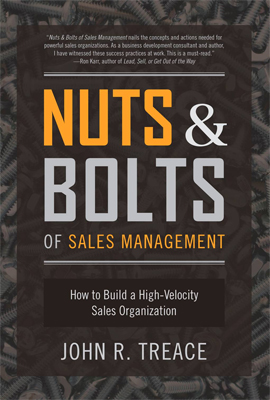Nuts and Bolts of Sales Management

Nuts and Bolts of Sales Management
"Don't run out of cash, no matter what."
"Throwing money at a problem doesn't work."
John Treace knows - perhaps better than any sales consultant - exactly why some businesses stumble and fail. He spent years as a sales and marketing hired gun whose sole job was to restructure sales departments of companies that were either bankrupt or on the verge of collapsing. His new book, Nuts & Bolts of Sales Management: How to Build a High-Velocity Sales Organisation, isn't filled with theories, it zeroes in on the fundamental problems he's seen time and time again, and provides clear, implementable solutions.
Floundering sales teams, Treace discovered, weren't struggling just because of poor sales techniques or inefficient forecasting, but because their companies didn't focus on establishing core values.
"You can call it 'The Ten Commandments' of sales management," says Treace, "guiding principles which underscore everything a business does when it comes to sales and marketing. Without them, a company is a ship without a rudder."
Treace's experience in bringing failing companies to a point at which they could go public showed that sales operations not centered and guided by firm principles and values were sabotaging their success. Sales policies that changed at the whim of management or sales teams, companies with no established culture, and inconsistent communication are sample ingredients of the recipe for failure Treace has identified.
"A bottom-line, exclusively hard numbers focus without a foundation of principles, tenets, and a precisely defined operating system inevitably leads to failure," adds Treace. "These are the common traits I've seen in every struggling company I helped resurrect."
Written for sales VP's, managers, salespeople who want to advance, as well as non-sales officers and investors, Nuts & Bolts of Sales Management addresses topics such as:
How core values and carefully crafted mission statements literally predict the success or failure of a company
The 5 most common mistakes sales organisations make
Why a 'Forward-Looking Living Document' for sales departments that identifies potential traps and pitfalls can keep a company out of trouble
How a little success can create a lot of overhead
Why managers should never keep a very high performing salesperson with a bad attitude
Why poor morale, even when executing well, can ruin a sales organisation
Why throwing money at problems never works
Operational strategies ranging from effective metrics and productive sales meetings to award programs, consultants, and compensation
"You can say my book is a guide to 'everything you didn't learn in business school,'" notes Treace. "Theories don't solve problems and prevent failure, battle-proven tactics based as much on people as financials do."
See The Five Essential Steps of a Successful Business Turnaround by John Treace: www.Femail.com.au/the-five-essential-steps-of-a-successful-business-turnaround
Nuts and Bolts of Sales Management
Author: John R. Treace
Interview with John Treace
Question: What inspired you to write Nuts and Bolts of Sales Management?
John Treace: In today's economic environment, business is often difficult and when it is, many companies put pressure on the sales team. I had a very successful sales management career and wanted to pass on what I learned over the years. Hopefully, this would help sales managers have less stress. Learning the hard way as I did by trial and error isn't fun and in today's business environment can be terminal for a sales manager. Also, for non-sales corporate officers (CEOs, COOs, and CFOs) and others, I wanted them to be able to have a quick read that would help them determine if their sales group was on the right track.
Question: What is your top tactics to save a business that is going bankrupt or on the verge of collapsing?
John Treace: 1. Carefully determine what needs to be fixed. A wrong fix can be catastrophic and to determine the right path requires a deep understanding of the business: employees, customer, market and the products or service of the company. Be careful of well meaning suggestions from those who do not have a deep understanding of the business.
2. Get the right people in the right places.
3. Develop your new vision and plan for the company, effectively communicate it, stick to it, and don't give up.
4. Make the hard decisions.
Question: Why are the tips provided in Nuts and Bolts of Sales Management not taught in business school?
John Treace: Most all of the tips are those that are learned by experience, and sometimes, the hard way. In school we learn the basics but we don't learn for instance what kind of high-performer we can't afford to have. You might think that you would never want to terminate any high performer but there is one kind that you cannot afford to have on your team. In school we don't learn the importance of employee morale, how to maintain it and measure it.
Question: How can a business develop a powerful sales culture?
John Treace: This is a huge question and one that does not have a short answer. My whole book addresses this question. But, if I were pushed for some key points here is what I would identify.
1. Define the culture you wanted to have by answering the question; "how would you know it if you saw it"?
2. Write Core Values that support your defined culture and effectively communicate them to all employees.
3. Hire high performers.
4. Don't show favoritism; keep the playing field level for all.
5. Your sales people should be able to answer "yes" to these questions:
a. Does the company and management care about me?
b. Can I trust the company and management?
c. Is the company and management committed to being the best that they can?
Interview by Brooke Hunter
MORE



